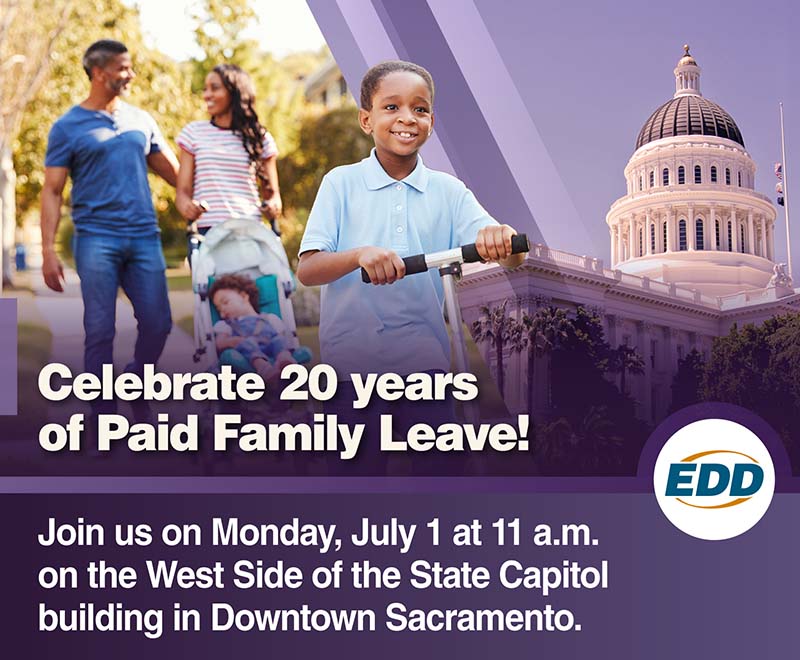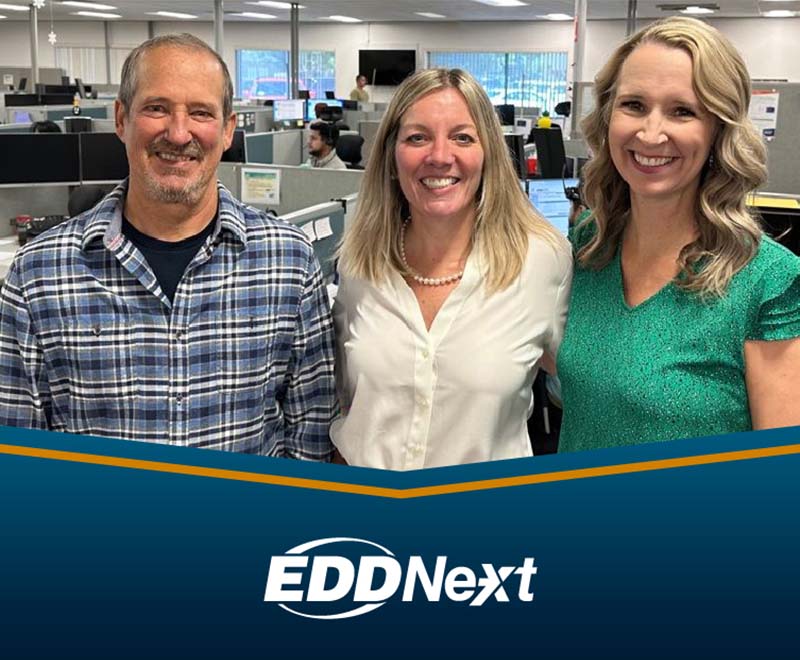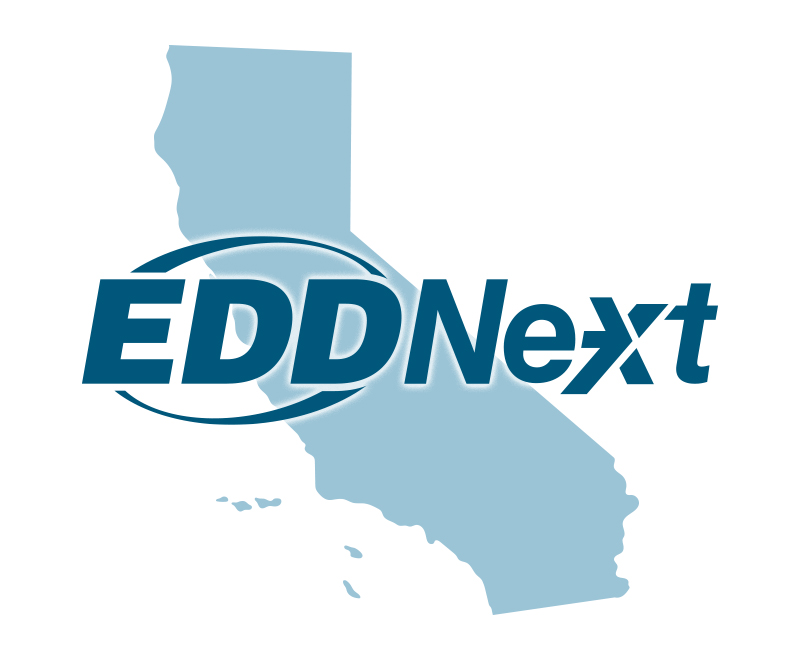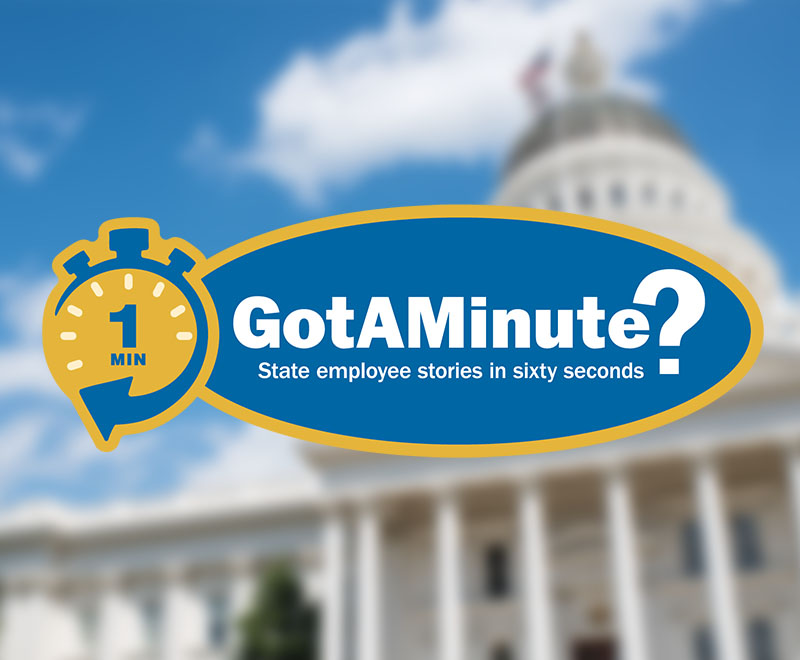
Benefiting Californians | June 2024
Welcome to the new Employment Development Department (EDD) newsletter, where we will share our story as the administrator of one of the nation’s largest public benefit systems—with over 21 million people filing 63 million unemployment, disability, and Paid Family Leave benefits claims over the past decade. We’re also the State’s largest tax collection agency and an integral player in the State’s workforce development system. This newsletter will help us transparently share our progress with some regular communication to help better inform you on the major changes impacting EDD customers.
Browse Articles
- Direct Deposit is Now Available!
- Celebrating 20 Years of Paid Family Leave
- New Surveys to Improve Customer Experiences
- Enhancing Customer Service at Disability Contact Centers
- Georgetown University Highlights EDD’s Innovative EDDNext Work
- Got a Minute? Watch How We Support the Armenian Community in 60 Seconds
- EDD Farmworker Advocates Partner with Farmworker Jobs Program
Subscribe to our newsletter!
Receive email updates on Department improvements, news, and more!
Direct Deposit is Now Available!

EDD’s launch of a direct deposit option for benefit payments marks another major milestone in modernizing and streamlining the State's unemployment, disability, and Paid Family Leave programs. This move reflects a commitment to enhancing efficiency and prioritizes convenience for Californians. As of June 17, customers can select from the options of direct deposit, prepaid debit card, or mailed checks for receiving benefits – depending on which option best meets their need.
Direct deposit is a safe, fast, and convenient way for payments to automatically go to a personal bank account. This new option not only reduces the administrative burden on the EDD, but also minimizes the risk of lost or stolen debit cards – enhancing the security of benefit payments. We recommend individuals with a bank account enroll in direct deposit.
New or returning customers can choose their payment option when they apply online for any of our benefit programs. Existing customers can update their payment option after first logging in to myEDD.
To select which option works best for you, visit Benefit Payment Options to see the unique features and payment schedules. You’ll also find detailed instructions and helpful videos on how to enroll in direct deposit.
With EDDNext modernization, it’s all about you, our customers, and making your experience with us faster and easier. For Californians, this development represents more than just a technological upgrade; it represents our commitment to providing efficient, accessible, and secure assistance to people in need. As we continue to modernize our services, our customers can look forward to more streamlined processes and improved experiences, reaffirming the Department's dedication to serving the people of California.
Celebrating 20 Years of Paid Family Leave

The State celebrates a remarkable milestone of 20 years of supporting Californians with our Paid Family Leave (PFL) program. On July 1, 2024, we invite you to join our celebration at the Paid Family Leave 20th Anniversary Family Resource Fair at the State Capitol. Learn more about this valuable program that supports Californians, discover resources available to help families, and have some fun!
Westside of State Capitol building
Monday, July 1, 2024
11 a.m. to 2 p.m.
This celebratory gathering will bring together community groups, advocates, and families in honor of two decades of the nation’s first PFL program – part of a valuable network of resources and assistance available to strengthen families across California.
EDD launched the Paid Family Leave program back in 2004 and today it continues to provide benefits that allow workers to be there with their families for the moments that matter most. Funded through contributions from workers noted on their paystubs, benefits support bonding with a new child, caring for a seriously ill family member, or assisting in a family member’s foreign military deployment.
Nearly 4.3 million Californians have received $15.6 billion in PFL benefits over the past 20 years when they need to take time off to care for loved ones. Their stories are also showcased in a new video we created, Celebrating 20 Years of Paid Family Leave (YouTube).
Here’s to 20 years of being there for the moments that matter most, and many more to come!
New Surveys to Improve Customer Experiences

We’re expanding our Voice of the Customer program to include new surveys as another key way of collecting important customer input. Starting June 28, customers can provide feedback on their experiences when visiting an EDD office or using our website. Surveys will be available in the EDD Tax offices and about 60 of the state’s America’s Job Center of California offices. This is in addition to the surveys in Disability Insurance and Paid Family Leave offices that launched last month as well as telephone surveys which are already offered in multiple languages.
The satisfaction surveys support our commitment to research and understanding our customers to deliver services in line with their needs. They also offer more ways for customers to engage with us and give feedback.
The short surveys will be available in English and Spanish to begin with and will expand to other languages and in more ways customers engage with us. To take the survey, customers can scan a QR code posted in offices, or they can select the Feedback button on any page of our website.
We’ll use survey findings to determine and prioritize service enhancements as we continue our EDDNext modernization efforts. This information will also help us provide positive experiences, discover new opportunities for improvements, and better meet customer preferences and expectations – all important to EDD’s goals of providing timely, accessible, and efficient services to Californians.
Enhancing Customer Service at Disability Insurance Contact Centers

Last year, we began working with Amazon Web Services (AWS) and InterVision, a leading IT managed services provider, to modernize our contact centers, which coordinate our electronic and telephone communications, and transform the EDD customer and employee experience.
Melissa Stone, Deputy Director of the EDD’s Disability Insurance Branch, was recently onsite at her Fresno office, which serves as the pilot site for this initiative. She said, “Our Mighty 224 Disability office is piloting this technology to gather insights and improve the experience for our customers and agents before rolling it out to the entire Disability Insurance and Paid Family Leave Programs.”
The pilot project represents a significant step forward in modernizing the delivery of services to Californians seeking benefits and other services. The new contact center platform has the potential to streamline operations and improve the overall customer experience by integrating call center and case management systems – enabling representatives to access real-time data and provide more timely and accurate assistance to EDD customers.
The Fresno office is poised to become a model for future contact center enhancements across the state. By leveraging technology and optimizing workflow processes, the project aims to reduce wait times, minimize call transfers, and increase first-call resolution rates.
Melissa expressed confidence in the project's success, citing the dedication and expertise of the team involved in its implementation. She also underscored the EDD's commitment to continuous improvement and innovation in delivering critical services to Californians. With customer service at the forefront, the EDD’s evolving and innovative approach to contact center operations promises to deliver tangible benefits for both customers and employees.
Georgetown University Highlights EDD’s Innovative EDDNext Work

Anaya Mehta at Georgetown University’s Beeck Center for Social Impact + Innovation recently wrote about the California Employment Development Department's (EDD) innovative approach to government technology procurement.
The Beeck Center for Social Impact + Innovation is a research center at Georgetown University dedicated to driving social change through innovative solutions and partnerships. Founded in 2014 by Sonal Shah, the Beeck Center works at the intersection of data, technology, and policy to address complex social challenges and promote inclusive economic growth.
Mehta found that by creating detailed profiles representing various stakeholders, such as applicants, employers, and staff, EDD gained insights into how to best design a project.
“While user personas should be modified to fit a given agency’s population and service context, CA EDD’s use of user personas offers a concrete example for representing the needs of internal and external users in a procurement or market research project,” Mehta wrote.
These user personas inform the procurement process, ensuring that technology solutions are tailored to meet the diverse needs of EDD's stakeholders. This user-centric approach enhances the usability and effectiveness of the technology implemented by the EDD, ultimately improving service delivery and customer satisfaction.
Recognizing the power of data to drive social change, the Beeck Center has led initiatives to harness data and technology for the public good. EDD is proud of the work it is doing through EDDNext to improve the customer experience for all Californians and appreciates the recognition from Georgetown University. The Department is also partnering with Georgetown in a national webinar series encouraging states to adopt a customer-centered focus in government operations.
Got a Minute? Watch How We Support the Armenian Community in 60 Seconds

In a significant step towards inclusivity and accessibility, we significantly expanded our multilingual services. The California Government Operations Agency, recognizing these important investments, recently interviewed Katrin Charmahali who works at our contact center in Inglewood, California.
During the interview, Charmahali discusses how offering services in-language not only helps improve customer service but is also a powerful statement about EDD’s commitment to inclusivity.
Individuals seeking unemployment benefits can now apply online and receive live telephone services with an EDD staff person in California's top eight most-commonly spoken languages, including Armenian. This move reflects California's commitment to ensuring that all residents, regardless of their preferred spoken language, can easily navigate the unemployment benefits system.
By offering dedicated phone services with EDD staff in languages such as Spanish, Chinese, Vietnamese, Tagalog, Korean, and now Armenian, we are breaking down barriers and providing equitable access to crucial support for those in need.
The inclusion of Armenian is particularly noteworthy, considering the significant Armenian population in California, especially in areas like Los Angeles and Glendale. This expansion acknowledges the diverse landscape of the state and acknowledges the importance of language access when seeking essential services.
EDD Farmworker Advocates Partner with Farmworker Jobs Program

EDD recently signed a new agreement to collaborate with the U.S. Department of Labor’s National Farmworker Jobs Program, a national and locally run program that helps farmworkers and their families acquire skills to find jobs in new industries. Local workforce service providers help provide the training.
The purpose of the agreement is to improve the integration, coordination, and delivery of services to farmworkers. Through the program, farmworkers are enrolled in job training programs and other services. One key aspect of the collaboration is a partnership with the Monitor Advocate System to ensure farmworkers have access to career services through the America’s Job Center of California network. The mission of the partnership is to improve the quality of life for California’s farmworkers.
The U.S. Department of Labor’s National Farmworker Jobs Program provides career services, training, and housing services to migrant and seasonal farmworkers. Other resources offered include youth services (such as tutoring and mentoring), short-term direct assistance, and housing.
More information about the effort is available in the Quarterly Workforce System Results Reports (QWSR), which provides a snapshot of programs and their progress in achieving goals of helping people find jobs and connecting workers to employers.
Learn more about the National Farmworker Jobs Program and the Agricultural Connection Community.
Connect with Us
Introducing EDDNext
Meet EDDNext and learn how we're transforming your EDD experience, from start to finish.
